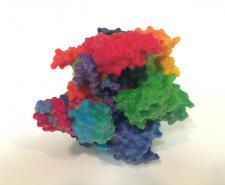The gene editor CRISPR won’t fully fix sick people anytime soon. Here’s why
By Jocelyn Kaiser,
Science/AAAS
| 05. 03. 2016
Untitled Document
This week, scientists will gather in Washington, D.C., for an annual meeting devoted to gene therapy—a long-struggling field that has clawed its way back to respectability with a string of promising results in small clinical trials. Now, many believe the powerful new gene-editing technology known as CRISPR will add to gene therapy’s newfound momentum. But is CRISPR really ready for prime time? Science explores the promise—and peril—of the new technology.
How does CRISPR work?
Traditional gene therapy works via a relatively brute-force method of gene transfer. A harmless virus, or some other form of so-called vector, ferries a good copy of a gene into cells that can compensate for a defective gene that is causing disease. But CRISPR can fix the flawed gene directly, by snipping out bad DNA and replacing it with the correct sequence. In principle, that should work much better than adding a new gene because it eliminates the risk that a foreign gene will land in the wrong place in a cell's genome and turn on a cancer gene. And a CRISPR-repaired gene...
Related Articles
By Katrina Northrop, The Washington Post | 04.06.2025
photo via Wikimedia Commons licensed under CC by 3.0
China's most infamous scientist is attempting a comeback. He Jiankui, who went to jail for three years after claiming he had created the world's first genetically altered babies, says he remains...
By Anna Louie Sussman, The New York Times | 04.01.2025
When Noor Siddiqui was growing up, her mother developed retinitis pigmentosa, a condition that leads to gradual vision loss. When Ms. Siddiqui’s mother was in her 30s, she began going blind. Last summer, Ms. Siddiqui told a podcast host that...
By Lisa Eadicicco, CNN [cites CGS' Katie Hasson] | 03.30.2025
23andMe, a standard-bearer for the at-home health movement, announced on March 23 that it has filed for Chapter 11 bankruptcy to facilitate a sale, prompting many of its 15 million customers to wonder: What happens to my genetic data now...
By Kevin Davies, Genetic Engineering & Biotechnology News | 03.27.2025
Around 2018–19, there was not a bigger science and ethical story than the debate over heritable human genome editing (HHGE) and the scandal over the “CRISPR babies.” The scientist, He Jiankui, who attempted to engineer the germline of human embryos...




